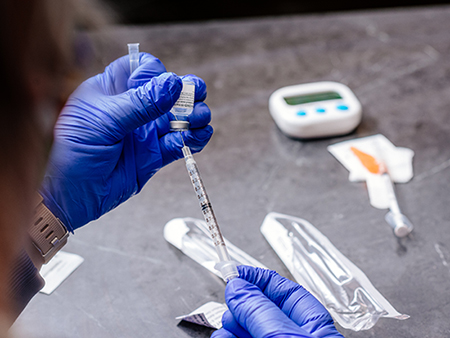Vaccination is one of the most convenient and safest preventive care measures available.
Media contact: Holly Gainer
 While the COVID-19 vaccine is here, health care providers want to remind patients that it is equally important to stay up to date on your current annual immunizations.
While the COVID-19 vaccine is here, health care providers want to remind patients that it is equally important to stay up to date on your current annual immunizations.
Yearly immunizations are considered preventive. Family medicine physicians at the University of Alabama at Birmingham want patients to schedule appropriate immunizations, on top of receiving the COVID-19 vaccine when it is available based on the Alabama Department of Public Health’s phased plan.
“In addition to the COVID-19 vaccine, there are many vaccines that can help prevent illness and keep patients healthy,” said Erin DeLaney, M.D., a family medicine physician and the vice chair for Clinical Operations and Quality for the Department of Family and Community Medicine at UAB. “These may include, but are not limited to, vaccines for the flu, pneumonia, shingles, tetanus and meningitis. If patients have questions about these immunizations, they should discuss them with their primary care physician. Any of these vaccines can be safely given at least 14 days before or after the COVID-19 vaccines.”
Sameera Davuluri, M.D., a family medicine physician who sees patients at the Family Medicine Clinic at UAB Medicine Hoover, notes the importance of consulting medical professionals when considering annual immunizations.
“Patients should check in with their primary care doctor who knows their health history,” Davuluri said. “The medical community recommends that nearly everyone take the COVID-19 vaccine as it becomes available to them. The CDC has created a guide for those who have questions about whether or not they should take the vaccine.”
DeLaney and Davuluri offer several recommendations pertaining to the COVID-19 vaccine and their responses to common questions asked by patients:
- The current available COVID-19 vaccines are safe for most people who are at least 16 years of age.
- Those who should not get a COVID-19 vaccine include anyone who has had a severe allergic reaction to a previous dose or component of either mRNA COVID-19 vaccine, an immediate allergic reaction of any severity to a previous dose or component of an mRNA COVID-19 vaccine (including polyethylene glycol), or an immediate allergic reaction of any severity to polysorbate.
- Precautions should be taken by those who have a history of immediate allergic reaction to any other vaccine or injectable therapy and those with moderate to severe acute illness.
- Patients who have been diagnosed with COVID-19, and those who have received the monoclonal antibodies or convalescent plasma treatment for the illness, need to wait 90 days before receiving the vaccine.
- Patients with chronic conditions can receive the vaccine.
- Patients who have immunocompromised conditions due to medications or illness may also receive the vaccine. These patients should be made aware that there is currently an unknown safety profile or effectiveness of the vaccine in immunocompromised populations; there is potential for a reduced immune response; and there is still a need to continue to follow all current guidance to protect themselves against COVID-19.
A full list of immunization recommendations and guidelines is available on the CDC’s website.
For more information about COVID-19, visit www.uab.edu/fightcovid19.
February 10, 2021 at 04:09AM
https://www.uab.edu/news/youcanuse/item/11846-don-t-forget-other-annual-immunizations-along-with-covid-19-vaccine
Don't forget other annual immunizations along with COVID-19 vaccine - UAB News
https://news.google.com/search?q=forget&hl=en-US&gl=US&ceid=US:en

No comments:
Post a Comment